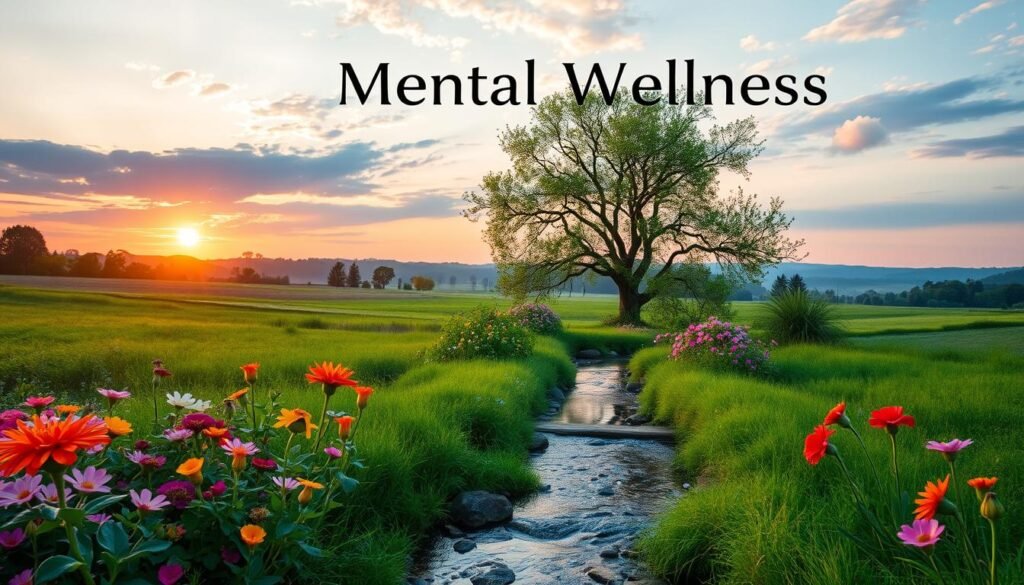I remember the darkness that surrounded me. It felt like a heavy weight on my chest, making it hard to breathe. Depression had taken over my life, like a storm that wouldn’t end. But I knew I had to fight back, to take back my happiness finding a way to deal with depression was my goal. I wanted to share what I learned with you. This way, we can all find a way to overcome it.
Dealing with depression can feel like a huge challenge. But, with the right help and strategies, we can move forward. We’ll look at the signs of depression, the science behind it, and ways to manage it.
It’s not an easy journey, but it’s worth it. By learning and using the right tools, we can face challenges and grow stronger. Let’s start this journey together and find ways to deal with depression today.
Understanding Depression: Signs and Symptoms to Recognize
Understanding depression is key to managing it welland how to Deal with Depression Deal with Depression symptoms show up in many ways, affecting our body and mind. Knowing these signs helps us get help and feel better.
Physical Symptoms of Depression
Depression can cause physical symptoms that affect our daily life. Some common signs include:
- Fatigue and low energy
- Disruptions in sleep patterns, such as insomnia or excessive sleeping
- Changes in appetite, leading to weight loss or weight gain
- Aches and pains, including headaches, muscle tension, and joint pain
These symptoms can make it hard to do everyday things.
Emotional and Behavioral Changes
Depression also changes how we feel and act. Some emotional and behavioral signs include:
- Persistent feelings of sadness, hopelessness, or emptiness
- Irritability, mood swings, and a short temper
- Loss of interest or pleasure in once-enjoyable activities
- Difficulty concentrating, making decisions, or remembering things
- Withdrawal from social interactions and isolation
These changes can hurt our relationships, work, and life quality.
When to Seek Professional Help
If you or someone you know shows these symptoms, get help. A mental health expert can help. They can create a plan to manage depression symptoms. Understanding and acting on depression is vital for better mental health.
The Science Behind Depression: What Happens in Your Brain
Understanding depression is key to better mental health. By exploring the brain, we see how chemicals, structures, and processes work together. This complex mix affects our mood and emotions.
Depression often starts with an imbalance in brain chemicals. These chemicals, like serotonin and dopamine, control our mood and thoughts. When they’re off, we might feel sad or struggle to focus.
Depression also changes the brain’s structure. Areas like the hippocampus and prefrontal cortex can shrink or change. This affects how we feel and think, making daily tasks hard.
Knowing how depression works helps us manage it better. We can find the right treatments, like therapy or medicine. This helps us balance our pure mind life and feel better emotionally and Deal with Depression
Professional Treatment Options and Their Effectiveness
Managing depression often requires professional help. There are many treatment options, each with its own benefits. Let’s look at the different ways to help with depression recovery.
Therapy and Counseling Approaches
Therapy and counseling can greatly help those with depression. Cognitive-Behavioral Therapy (CBT) helps change negative thoughts into positive ones. Interpersonal Therapy (IPT) improves how we communicate and connect with others, which is key in managing depression.
Medication Management
Antidepressants, like SSRIs and SNRIs, can help treat depression. They balance brain chemicals to ease symptoms. Finding the right medication and dosage is crucial, so work closely with your doctor.
Alternative Treatment Methods
There are also alternative treatments for depression. Transcranial Magnetic Stimulation (TMS) uses magnetic fields to stimulate the brain, improving mood. Ketamine infusions have shown quick and lasting effects in treating severe depression.
Every person’s depression is different, so there’s no single treatment for everyone. It’s important to work with healthcare professionals to create a treatment plan that fits your needs. This plan should include a mix of proven methods for the best results in depression recovery.
Natural Ways to Deal with Depression
Living with depression has taught me a lot. I’ve found that natural ways to cope can be very powerful. Adding self-care to my daily life has changed my emotional health for the better.
Mindfulness and meditation have been key for me. They help me relax, reduce stress, and find peace. Simple breathing and guided meditations are now part of my daily routine.
- Regular exercise, like walking or yoga, has also helped a lot. It boosts my mood and improves my mental health.
- Watching what I eat has been important too. Eating foods that make me feel good, like fish and dark chocolate, helps my mood.
- Having a strong support system is crucial. Talking to loved ones and being around them helps me manage my depression.
Every person’s battle with depression is different. But trying natural ways to cope has been a big part of my healing. These practices help me manage my mental health and feel more in control.
Creating a Daily Routine for Mental Wellness
Having a daily routine can help manage depression and improve mental health. By adding special activities to our mornings, evenings, and weekends, we support our emotional and mental health.
Morning Rituals for Emotional Balance
Mindful activities in the morning can shape our day. Try meditation, journaling, or stretching to start your day. These habits help you feel centered and ready for the day.
Evening Practices for Better Mental Health
Evenings are for unwinding with calming routines. Use deep breathing, reading, or hobbies like coloring to relax. These activities help you unwind and get ready for sleep.
Weekend Self-Care Activities
- Plan and enjoy a leisurely weekend brunch with friends or family
- Explore a new hiking trail or spend time in nature
- Indulge in a relaxing spa treatment or pampering session
- Engage in a creative hobby, such as painting, writing, or crafting
- Schedule a technology-free day to disconnect and recharge
Adding these depression self-care activities to your routine can bring balance and well-being. This is key in managing depression.
The Role of Exercise in Managing Depression
I’ve struggled with depression and found exercise to be a game-changer. While meds and therapy are key, exercise has been a big help. It’s changed my life for the better.
Exercise greatly improves our mental health. The science backs it up. It releases happy hormones, reduces brain inflammation, and even grows new brain cells. These changes help improve mood and reduce depression symptoms.
There are many exercises that help with depression. Here are some:
- Aerobic activities like brisk walking, jogging, swimming, or cycling
- Strength training exercises using weights or bodyweight
- Yoga and other mindful movement practices
- Dance and other forms of expressive movement
It’s important to pick an exercise you like and can do regularly. Consistency is key for mental health benefits. Even a short 30-minute workout a few times a week can help a lot.
Adding exercise to my daily life has been amazing. I feel happier, more energetic, and stronger against tough feelings. If you’re fighting depression, try exercise as part of your treatment. It could be the game-changer you need.
Nutrition and Diet: Impact on Mental Health
Eating well is key to managing depression and keeping your mind healthy. I’ve seen how food choices can affect our mood. Let’s explore how what we eat can help our mental health.
Foods That Fight Depression
Some foods are packed with nutrients that fight depression. Omega-3 fatty acids in fish, nuts, and seeds help balance mood and reduce brain inflammation. Also, complex carbs like whole grains boost serotonin and energy.
Supplements and Natural Remedies
Along with a good diet, supplements and natural remedies can help too. Vitamins B and D, magnesium, and probiotics are good for mental health. But, always talk to a doctor before trying new supplements.
Meal Planning for Mental Wellness
- Eat a variety of foods like fruits, veggies, lean proteins, and whole grains every day.
- Drink lots of water to stay hydrated.
- Avoid processed foods, sugary snacks, and too much caffeine, as they can mess with mood and energy.
- Find meal planning and cooking methods that fit your life and taste, making healthy eating easier.
By focusing on nutrition and diet for depression, you can support your mental health. Small, steady changes can greatly improve how you feel physically and mentally.
Building a Support System: Family and Friends
Having a strong support system is key when dealing with depression. Family and friends are crucial, offering a shoulder to lean on and a listening ear. I’ve seen firsthand how important a supportive network is in recovery.
Loved ones can create a safe space to talk about our feelings and experiences. Depression support means being there for us, validating our emotions, and encouraging professional help when needed. Trust and open communication are vital for depression recovery.
Sharing activities and hobbies with family and friends can bring a sense of normalcy. Going for walks, sharing meals, or watching movies together can lift our spirits. These moments remind us we’re not alone in this fight.
- Communicate openly and honestly with your loved ones about your mental health needs.
- Cultivate a support network that understands and empathizes with your experiences.
- Participate in enjoyable activities together to foster a sense of belonging and purpose.
Support from family and friends is a vital part of recovery. Building these relationships gives us hope and resilience in fighting depression.
Mindfulness and Meditation Techniques
I’ve struggled with depression, but mindfulness and meditation changed my life. These practices help me cope with depression and bring a sense of calm I never thought I’d find.
Basic Meditation Practices
Basic meditation is a key practice for me. I find a quiet spot, sit straight, and focus on my breath. Just being in the moment and observing my thoughts without judgment has greatly improved my well-being.
Breathing Exercises for Anxiety Relief
Breathing exercises also help with anxiety, a common companion to depression. The 4-7-8 method, where I breathe in for 4 seconds, hold for 7, and breathe out for 8, calms my mind and body when I’m stressed.
Mindfulness and meditation have been a game-changer for me. They help me manage depression and bring a sense of peace. I urge anyone fighting depression to try these techniques and see the positive effects on their mental health.
Conclusion
In this article, we’ve looked at many ways to deal with and beat depression. We’ve covered signs, symptoms, and the science behind it. We’ve also talked about professional treatments and natural remedies.
Understanding depression is key. It’s a complex issue that needs a complete approach. By making lifestyle changes, getting professional help, and using natural remedies, you can improve your mental health. Remember, what works for one person might not work for another. But with effort and time, you’ll find what works for you.
Keep moving forward as you deal with depression and overcome depression. Be gentle with yourself. Every small win is important. Surround yourself with people who support you, take care of yourself, and ask for help when needed. Together, we can face this challenge and come out stronger, ready to live a fulfilling life.



